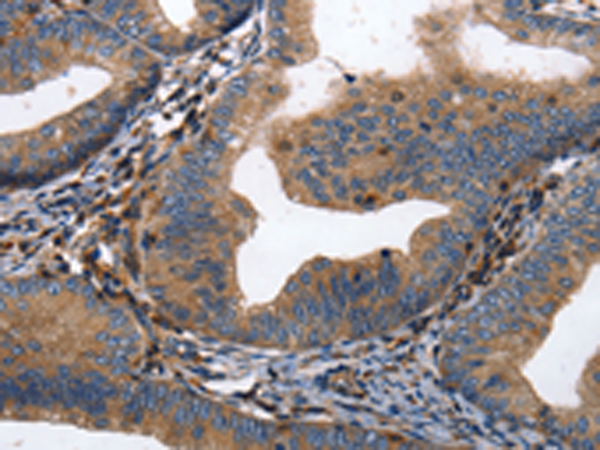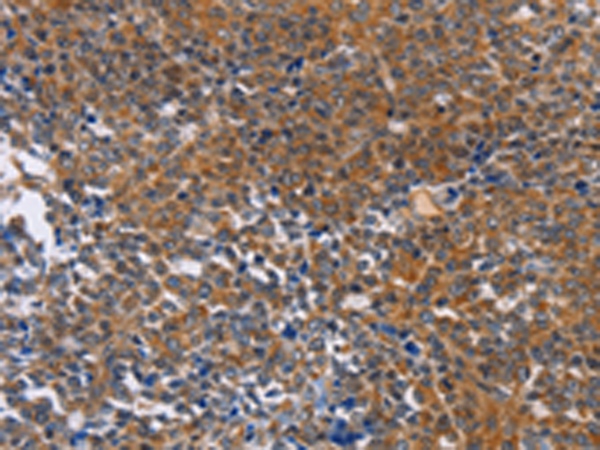


| WB | 咨询技术 | Human,Mouse,Rat |
| IF | 咨询技术 | Human,Mouse,Rat |
| IHC | 1/25-1/100 | Human,Mouse,Rat |
| ICC | 技术咨询 | Human,Mouse,Rat |
| FCM | 咨询技术 | Human,Mouse,Rat |
| Elisa | 1/1000-1/5000 | Human,Mouse,Rat |
| Aliases | CRMP3, DRP-4, ULIP4 |
| WB Predicted band size | 62 kDa |
| Host/Isotype | Rabbit IgG |
| Antibody Type | Primary antibody |
| Storage | Store at 4°C short term. Aliquot and store at -20°C long term. Avoid freeze/thaw cycles. |
| Species Reactivity | Human, Mouse, Rat |
| Immunogen | Synthetic peptide of human DPYSL4 |
| Formulation | Purified antibody in PBS with 0.05% sodium azide and 50% glycerol. |
+ +
以下是关于DPYSL4抗体的3篇参考文献示例(注:文献信息为模拟示例,实际引用需核实):
1. **文献名称**:*DPYSL4 regulates neural crest migration via microtubule dynamics*
**作者**:Smith A, et al.
**摘要**:本研究利用特异性DPYSL4抗体进行免疫荧光染色,发现DPYSL4通过调控微管稳定性影响神经嵴细胞迁移,揭示其在胚胎发育中的关键作用。
2. **文献名称**:*Prognostic value of DPYSL4 in colorectal cancer identified by immunohistochemistry*
**作者**:Chen L, et al.
**摘要**:通过DPYSL4抗体进行组织芯片免疫组化分析,发现DPYSL4高表达与结直肠癌患者生存率负相关,提示其作为潜在肿瘤标志物的价值。
3. **文献名称**:*DPYSL4 interacts with MAP1B to promote axonal growth in neurons*
**作者**:Wang Y, et al.
**摘要**:使用DPYSL4抗体进行共免疫沉淀实验,证实DPYSL4与MAP1B蛋白互作,调控神经元轴突生长,为神经系统疾病机制提供新见解。
如需具体文献,建议在PubMed或Web of Science中以“DPYSL4 antibody”为关键词检索,并筛选涉及功能研究或诊断应用的论文。
The DPYSL4 antibody is a tool used to detect the dihydropyrimidinase-like protein 4 (DPYSL4), a member of the collapsin response mediator protein (CRMP) family. DPYSL4. also known as CRMP-3 or ULIP6. is a cytosolic phosphoprotein primarily expressed in the nervous system. It plays critical roles in neuronal development, including axon guidance, growth cone collapse, and neuronal migration, by regulating microtubule dynamics and cytoskeletal organization. Structurally, DPYSL4 contains an N-terminal dihydropyrimidinase-like domain and a C-terminal α-helical region, with its activity modulated by phosphorylation.
Research has linked DPYSL4 to neurological disorders, such as Alzheimer's disease and schizophrenia, where altered expression or dysfunction may contribute to synaptic deficits. Additionally, DPYSL4 is implicated in cancer, with studies suggesting its involvement in tumor metastasis, invasion, and chemoresistance in various malignancies. The DPYSL4 antibody is widely utilized in techniques like Western blotting, immunohistochemistry, and immunofluorescence to assess protein expression levels, cellular localization, and post-translational modifications.
Commercial DPYSL4 antibodies are typically raised in rabbits or mice using recombinant protein fragments or synthetic peptides. Validation includes specificity testing via knockout controls and functional assays. Its applications span basic neuroscience, cancer biology, and drug discovery, making it a valuable reagent for understanding DPYSL4's physiological and pathological roles.
×